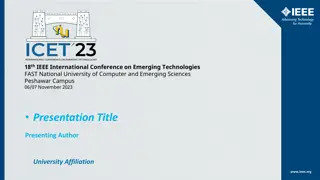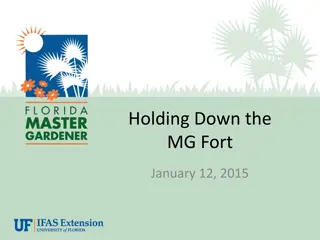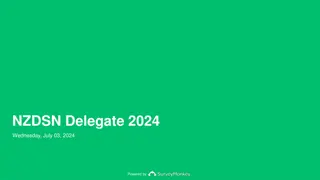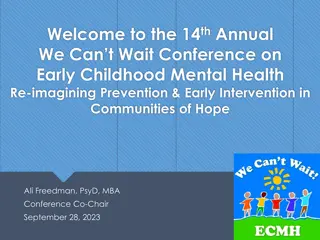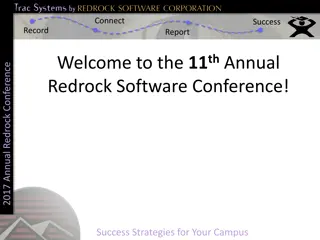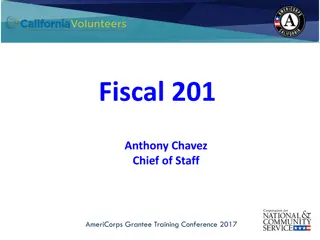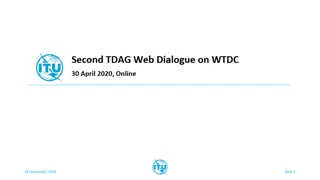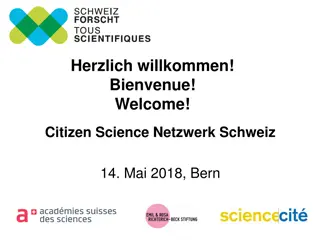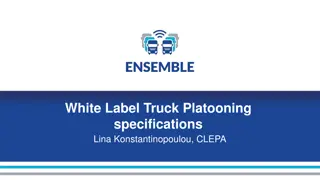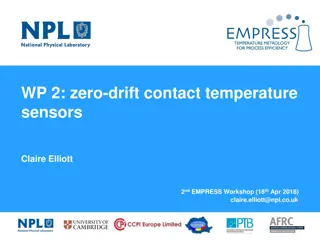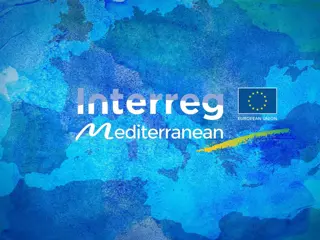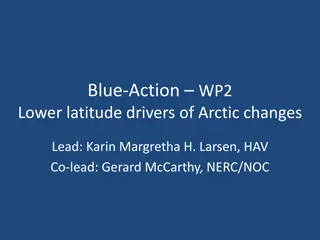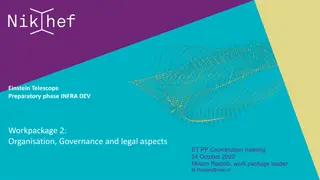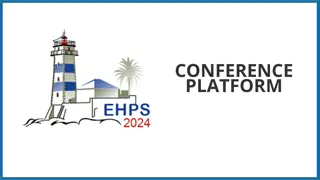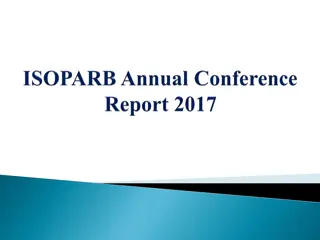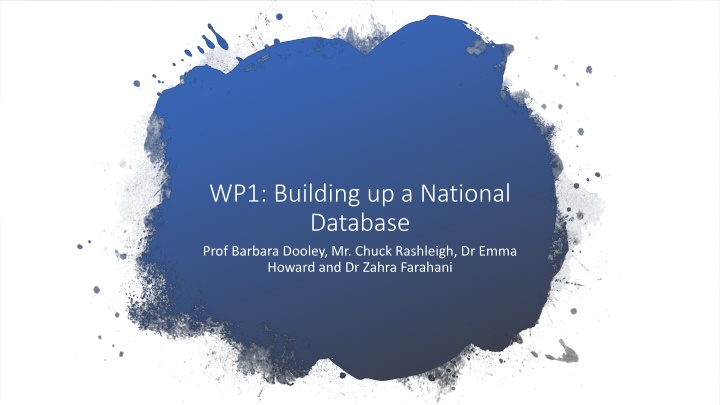
National Database Building for Student Counselling Services in Irish Higher Education
"Join Prof. Barbara, Mr. Chuck, Dr. Emma, and Dr. Zahra in this project aiming to establish a national database for student counselling services in Irish higher education. Explore core aims, research standardization, and the importance of standardized datasets for future evaluation and expansion."
Download Presentation

Please find below an Image/Link to download the presentation.
The content on the website is provided AS IS for your information and personal use only. It may not be sold, licensed, or shared on other websites without obtaining consent from the author. If you encounter any issues during the download, it is possible that the publisher has removed the file from their server.
You are allowed to download the files provided on this website for personal or commercial use, subject to the condition that they are used lawfully. All files are the property of their respective owners.
The content on the website is provided AS IS for your information and personal use only. It may not be sold, licensed, or shared on other websites without obtaining consent from the author.
E N D
Presentation Transcript
WP1: Building up a National Database Prof Barbara Dooley, Mr. Chuck Rashleigh, Dr Emma Howard and Dr Zahra Farahani
Activity Format Timeline Zoom webinar open for joining 9.45 General presentation part 1 Barbara 10.00 Client data Emma 10.10 Discussion on client data Breakout discussion 10.30 Feedback from groups 11.00 Zahra 11.10 Counselling services data Presenting issues Zahra 11.20 Discussion Breakout discussion 11.30 Feedback from groups 12.00 General presentation part 2 Barbara 12.10 Q&A session WP answers questions sent in advance or raised during webinar 12.20
House Rules: Please keep your microphone muted when you are not talking. This is to minimise the background noise. Please use the chat box for asking questions or making comments during the presentation. Please turn off the video feed if occurrences happen in the background.
Overview of Project
Core Aims: 1. Create a standardised national database for student counselling services in Irish Higher Education Institutes (HEIs). 2. Establish a Practice-Research Network (PRN) collaboration between researchers and practitioners 3. Support services in using outcome measures for routine evaluation.
Research Standardisation Establishing database Towards the Future Literature Review Develop standardised dataset Develop benchmark reports, interactive ap et cetera for counselling centres Work with HEIs to ease transfer of data, comply with HEI ethics and GDPR Conduct and analyse interviews Recruit pilot HEIs Collect one semester of standardised data Present findings at PCHEI meetings and conferences Secure funding for future maintenance of dataset Expand to more HEIs
Standardisation Gender/Sex: Male/Female Male/Female/Other Male/Female/Transgender Male/Female/Non-Binary Male/Female/Non-Binary/Don t want to specify Please fill in gender please indicate your gender identity and preferred pronoun
Standardised Dataset Conducting interviews with staff in HEIs Collected intake forms from different HEIs Reviewed similar initiatives for example CCMH and SCORE consortium Reviewed PCHEI annual data collection WP team proposes a standardised dataset (SDS) Voice of counsellors through group feedback (Webinar, 26/5/20) Individual feedback from counsellors (Qualtrics survey, 29/5/20) Review by GDPR and ethics Finalise minimum and maximum SDS (June 2020)
Section A: Client Data
Client Index Gender Age Sessions Attended SUSI Religion/Spiritual Belief Study Field 1 Female 18 4 Yes Roman Catholic Education 2 Male 20 2 No Atheist Engineering, Manufacturing & Construction 3 Male 19 6 Prefer not to say Other Arts and Humanities 4 Non-Binary 27 3 No Roman Catholic Arts and Humanities
Academic Year Description of Counselling Service HEI HEI Anonymous Pseudo Code HEI Type (University, IoT, Other) HEI Size (small, medium, large) SDS A.1.x
Sessions Offered, Attended, Not Attended Therapy Support Received Counselling Session Type (One- to-one, group, single session) Client Status (returning yes or no) Closure end of therapy SDS A.2.x
Option 1: Male, Female, Transgender Male, Transgender Female, Non-binary Option 2: Male, Female, Non-binary, Other Gender Option 3: GenderQueer, GenderFluid, Male, Female, GenderVariant, Non- binary, Self-Assign Gender SDS A.3.2
This variable is proposed instead of country of origin or nationality. Country of Domicile Response: Europe EU; Europe Non-EU; Asia; Oceania; Africa; America North; America South; Other SDS A.3.4
Q. What is your ethnic or cultural background? Option 1: White Irish, White (not Irish), Asian/Asian Irish, Black, Mixed Option 2: White Irish, Irish Traveller, Any other White background, Black or Black Irish, Asian or Asian Irish, Prefer not to say, Other including Mixed Background Option 3: White Irish, Irish Traveller, Any other White background, African, Any other Black Background, Chinese, Any other Asian background, Prefer not to say, Other including Mixed Background Ethnicity SDS A.3.6
Arts and Humanities Natural Sciences, Mathematics & Statistics Engineering, Manufacturing & Construction Business, Administration & Law Agriculture, Forestry, Fisheries & Veterinary Social Science, Journalism & Information Education Services Information & Communication Technologies (ICTs) Generic Programmes and Qualifications Health & Welfare Study Level, Field, & Year SDS A.3.8/.9/.10
Q. Are you registered as any of the following ... Mature, HEAR, Placement Response: Yes, No SDS A.3.12/13/15
Option 1: With who do you live? Response: Alone, Spouse, Partner or significant other, Roommate(s), Children, Parent(s) or guardian(s), Family other, Other (please specify) Living Arrangements Option 2: Type of accommodation during term time: Response: Family home, Campus Residence, Private Rented accommodation, Digs, Other SDS A.3.16
Please estimate the number of hours per week you are actively involved in organised extra- curricular activities (e.g., sports, clubs, student union, etc.): Extra- curricular Activities, Paid Work Q. What is the average number of hours you work per week during the academic year (paid employment only)? SDS A.3.14/18
Q. How many hours of sleep do you get on average? Sleep, Q. Have you ever used alcohol or drugs to cope with your issues? Alcohol/Drugs, Medication Q. Are you on medication for a mental health issue? SDS A.3.17/.19/.22
Q. Please tick any mental health professionals outside the student counselling service whom you currently consult? Response: Family GP, Primary care setting, Hospital, On-campus mental health support, Psychotherapist, Jigsaw or similar, Other Mental Health To what extent are your current issues affecting your mental health? SDS A.3.20/21
DARE Client registered with disability Client registered with mental health disability Client registered with disability but not meeting the criteria for mental health disability Client not registered other health issue although fulfilling criteria for registration Disability SDS A.4.x
Option 1: Yes, No Option 2: How many times it has occurred Option 3: The last time it occurred Option 4: Level of risk for each category (self-harm, harm to others, suicide) Option 5: Report how many students assessed as severe suicide risk and how many as moderate risk of suicide Risk (self-harm, harm to others, suicide) SDS A.5.1
Q1. To what extent are you considering leaving your course because of your problems? Q2. To what extent would you say your problems are affecting your study? Counselling Impact on Academic Outcomes (CIAO) ... Q9. To what extent would say that counselling has helped you feel more positive about the future? SDS A.6.1
Discussion on Client Data
Counselling Services Data
Counselling Services Data This data would be collected on a per counselling service basis Similar to PCHEI annual data collection The data could be used to provide a sector overview for an annual report, for funding statistics and benchmarking if services wish
Types of Counselling Services Data HEI description (discussed previously) Overview of full-time equivalent staff in counselling services Overview of the headcount of staff in counselling services Student numbers Additional services Overview of counsellors
FTE Overview (SDS B.2.x) B.2.1 Total FTE FTE categories taken from the annual PCHEI data collection. These could be used to provide a sector overview at the beginning of an annual report. B.2.2 Permanent Counselling Staff FTE B.2.3 Sessional Counsellors FTE B.2.4 Trainee FTE B.2.5 Paid AP FTE B.2.6 Unpaid AP FTE B.2.7 Volunteer Counsellors FTE B.2.8 Unpaid Interns FTE B.2.9 Paid Interns FTE B.2.10 Other Paid Counsellor FTE B.2.11 Other Unpaid Counsellors FTE
Staff Headcount Overview (SDS B.3.x) B.3.1 Total Staff numbers (headcount) Headcount categories taken from the annual PCHEI data collection. These could be used to provide a sector overview at the beginning of an annual report. B.3.2 No. of Permanent staff B.3.3 No. of Sessional B.3.4 No. of Trainees B.3.5 No. of Paid Intern B.3.6 No. of UP Intern B.3.7 No. of AP B.3.8 No. of Volunteers B.3.9 No. of Other Staff
Student Numbers (SDS B.4.x) B.4.1 Enrolment eligibility Institution counselling services (Please indicate if the following cohorts can avail of services: part-time students, full-time students, remote/distance students) enrolment eligible for Please categories counselling: full-time students, part-time students, distance/remote Figures can be then taken from the HEA to calculate HEI enrolments. indicate can which access or learners. B.4.2 Number of clients Number counselling (not outreach) of clients who accessed Open numerical response B.4.3 Average waiting times Currently this is measured differently
Additional Services (SDS B.5.x) B.5.1 No. of students reached through outreach No. of staff reached through outreach This section is showing how much work counselling services do. While one-to-one counselling is the bulk of the work done by counselling, the rest of the work should be captured in some way. NUIG annual report is a good example of showing the extent of https://www.nuigalway.ie/counsellors/policies/reports/ B.5.2 supports provided: B.5.3 No. of workshops offered to students B.5.4 No. of workshop attendees (students) B.5.5 No. of workshops offered to staff B.5.6 No. of workshop attendees (staff) B.5.7 No. of workshops offered to parents B.5.8 No. of workshop attendees (parents) B.5.9 No. of students who used online counselling programmes SilverCloud, Participate) (e.g. B.5.10 No. of online sessions completed by students HEI Services integrated with counselling service No. of research projects undertaken B.5.11 B.5.912
Overview of Counsellors (SDS B.6.x) B.6.1 Counsellor Gender These could be used to provide a sector overview at the beginning of an annual report. B.6.2 Counsellor Ethnicity B.6.3 Highest professional degree completed B.6.4 Discipline of highest degree B.6.5 Year of highest professional degree B.6.6 Member of following organisations: PSI etc. B.6.7 Number of years in student counselling B.6.8 Position type B.6.9 How much is your current therapeutic practice guided by each of the following theoretical frameworks
Presenting issues: Capturing the presenting issues helps us to understand why the client is seeking help. AUCC/PCHEI categories are the most common categories across the sector. AUCC/PCHEI categories include 15 main categories and more than 200 subcategories. Some services use different categories while others have added extra categories to AUCC/PCHEI.
Proposed plan for the SDS: Include the AUCC main categories. Add sexual assault as a main category. Receive feedback from counsellors through group discussions on the description of each main category. Work with services using different categories to map their categories to the AUCC/PCHEI categories.
General Presentation part 2
Use of the Database Annual national report (could be benchmarked internationally) Annual benchmarking report for each HEI Access to statistics for funding applications and Freedom of Information requests Dataset for Practice-Research Network Identification of trends
Pilot (semester 1 2020/21) Sign up with interested HEI counselling services For HEIs participating, a team member will: Connect with management (call/visit) Work with HEIs to see how best to extract data from their system Help prepare relevant documents (e.g. ethics, GDPR, consent) Prepare contracts/agreements between WP and HEIs Support the collection of one semester of data Help cleaning and transfer of the data
Towards the Future Clarify technical aspects of the database Conduct pilot Feedback and address the issues raised from the pilot Consultation with counsellors and webinar on outcomes measures Second round of data collection Develop regulationsfor the maintenance and future of the database Identify how best to fund maintenance of the database


